Financial Security
The poor don't want some small life. They want to contribute, and they want to thrive. But poverty reduces people born for better things.
Matthew Desmond, Author
Our Mission
Financial instability has always been a pressing issue for individuals who live below the poverty line, particularly those from underrepresented communities, such as racial minorities, women, and children. These individuals are often deprived of financial literacy training, education, secure housing, legal protections, and basic social rights. However, a group of young change-makers has taken up the cause of researching these problems and finding solutions through financial initiatives, education, policy reforms, and community-based services.
Our Work
On April 3, 2024, the Teen Think Tank Academy’s Financial Security Research Cohort presented its policy framework in a live webinar.
We hope you enjoy it, but more importantly, we hope you are moved by the motivation, dedication, and leadership of our society’s future leaders!
Our Framework
Achieving Economic Equality in America: A Path Toward Financial Secuirty Through Meaningful and Sustained Reform
Achieving financial stability in the United States is hindered by several interconnected challenges. Insufficient financial literacy education, socio-economic disparities limiting access to education, and the enduring housing crisis all contribute to this complex landscape. To address these issues effectively, a blend of educational programs and policy adjustments is necessary.
Furthermore, systemic issues like racism, financial insecurity, and societal norms intersect, perpetuating economic disparities. Biased lending, workplace discrimination, and societal expectations all contribute to unequal wealth accumulation. Confronting historical injustices, challenging discriminatory practices, and reshaping societal norms are essential steps toward a more equitable society.
Moreover, legal and political impediments, such as unfair labor practices and inadequate childcare support, hinder poverty reduction strategies. Examining tax regulations’ impact on poverty and considering prison reform’s potential role in promoting economic equality are also crucial aspects.
Through comprehensive solutions and a holistic approach, we can dismantle barriers and foster a more inclusive and prosperous future for all Americans.
Economic Impediments
Attaining financial stability is vital for everyone, yet numerous obstacles within America’s economic and financial systems make this task daunting. These hurdles include insufficient financial literacy education, socio-economic disparities hindering access to education, and the persistent housing crisis. To address these challenges effectively, this section advocates for a blend of educational programs and policy adjustments. By implementing these measures, we strive to dismantle economic barriers and foster a more equitable financial landscape for all Americans.
Social Impediments
In American society, systemic racism, financial insecurity, and social norms intricately intertwine, shaping opportunities and experiences across diverse communities. In this section, we explore these intersecting forces and examine how historical legacies and discriminatory practices perpetuate economic disparities. From biased lending to workplace discrimination, marginalized groups face enduring barriers to wealth accumulation. Additionally, societal expectations, from beauty standards to language biases, further perpetuate inequality. To address these issues, a comprehensive approach is needed: confronting historical injustices, challenging discriminatory practices, and reshaping societal norms. By illuminating these interconnected challenges and proposing actionable solutions, this article aims to catalyze progress toward a more equitable society.
Legal & Political Impediments
Legislation has traditionally played a key role in addressing the issues surrounding financial insecurity. Specifically, social security benefits were created “to keep American families from becoming destitute – in health or the essentials of life” (Altmeyer et al., 1945). Today, this mission statement has changed to “provide for the material needs of individuals and families” (SSA et al., 2023). However, the basic premise behind Supplemental Security Income remains unchanged: this program assists families in poverty through monetary grants based upon an array of factors including but not limited to assets, marriage status, residential situation, employment status, and citizenship status (SSA et al., 2023). Despite this goal, the SSI program provides little relief for most Americans in need.
Policy Recommendation
Achieving financial stability in the United States requires a holistic approach that addresses educational inequalities, socio-economic disparities, housing challenges, systemic racism, discriminatory practices, and legal barriers. By implementing targeted educational programs, advocating for policy reforms, and addressing systemic inequities, we can work towards a more inclusive and prosperous future for all Americans.
Read the complete policy framework on Medium.com or download it here.
Our Story
Every semester the Teen Think Tank Project welcomes high-potential teens from across America to explore, research, and develop a policy framework aimed at solving some of America’s most troubling social justice issues. This is the story of ten teen change agents who have dedicated 3 months to changing the economic, social, and political landscape to ending poverty in America!
Our Team
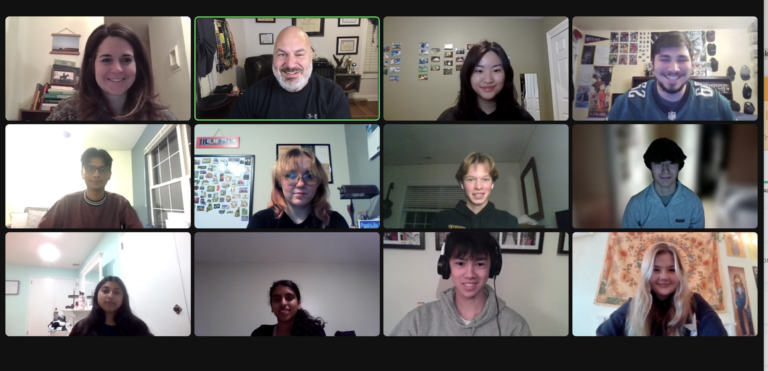
Connect with us on LinkedIn!
- Harsha Ahmed (’25): Bridgewater Raritan High School, Bridgewater, NJ
- Quin Spear (’26): Walter Payton College Prep, Chicago, IL
- Diego del Castillo (’26): Walter Payton College Prep, Chicago, IL
- Mahi Jaladi (’27): Livingston High School, Livingston, NJ
- Matthew Lerch (’26): Walter Payton College Prep, Chicago, IL
- Lara Manhani Mattos (’25): Global Village School, Lincoln, NE
- Keely McAteer (’25): Camden Catholic High School, Cherry Hill, NJ
- James Parlee (’25): Central Bucks West High School, Doylestown, PA
- Srinidhi Suvarapu (’25): Central Jersey College Prep, Somerset, NJ
- Lily Xu (’26): Bridgewater Raritan High School, Bridgewater, NJ
Our Motivation
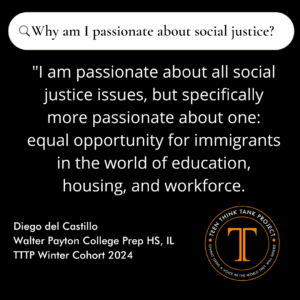
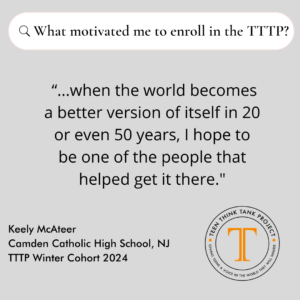
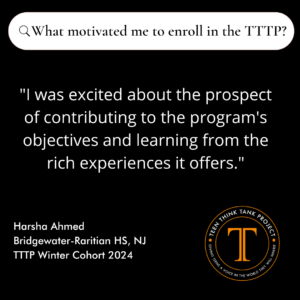
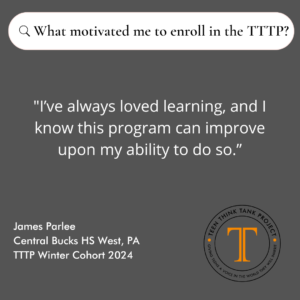
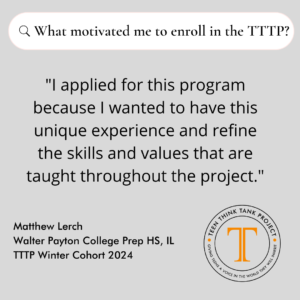
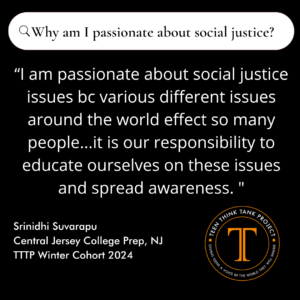
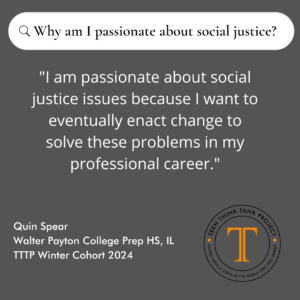
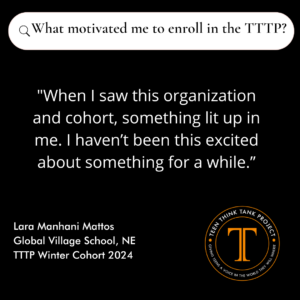
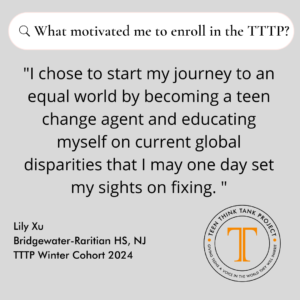
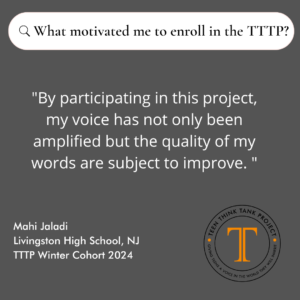
Our Research Associates of the Month
Every month, we recognize a research associate for their contributions to the cohort. These teen change agents stand apart because of their tremendous leadership, research skills, problem-solving abilities, and dedication & commitment to the process of bringing about social change.
Our Scholarship
Each session, the Teen Think Tank Project awards a cash scholarship to the research associate who best exemplifies our community’s values. Since all of our talented cohort members are eligible to apply, awarding the scholarship is an extremely difficult task. This session was no different. We thank all of our research associates for applying and commend our finalists, Harsha Ahmed and James Parlee, for their hard work and dedication!
Congratulations to James Parlee for being named the cohort’s Most Outstanding Research Associate and receiving a $500 scholarship.





